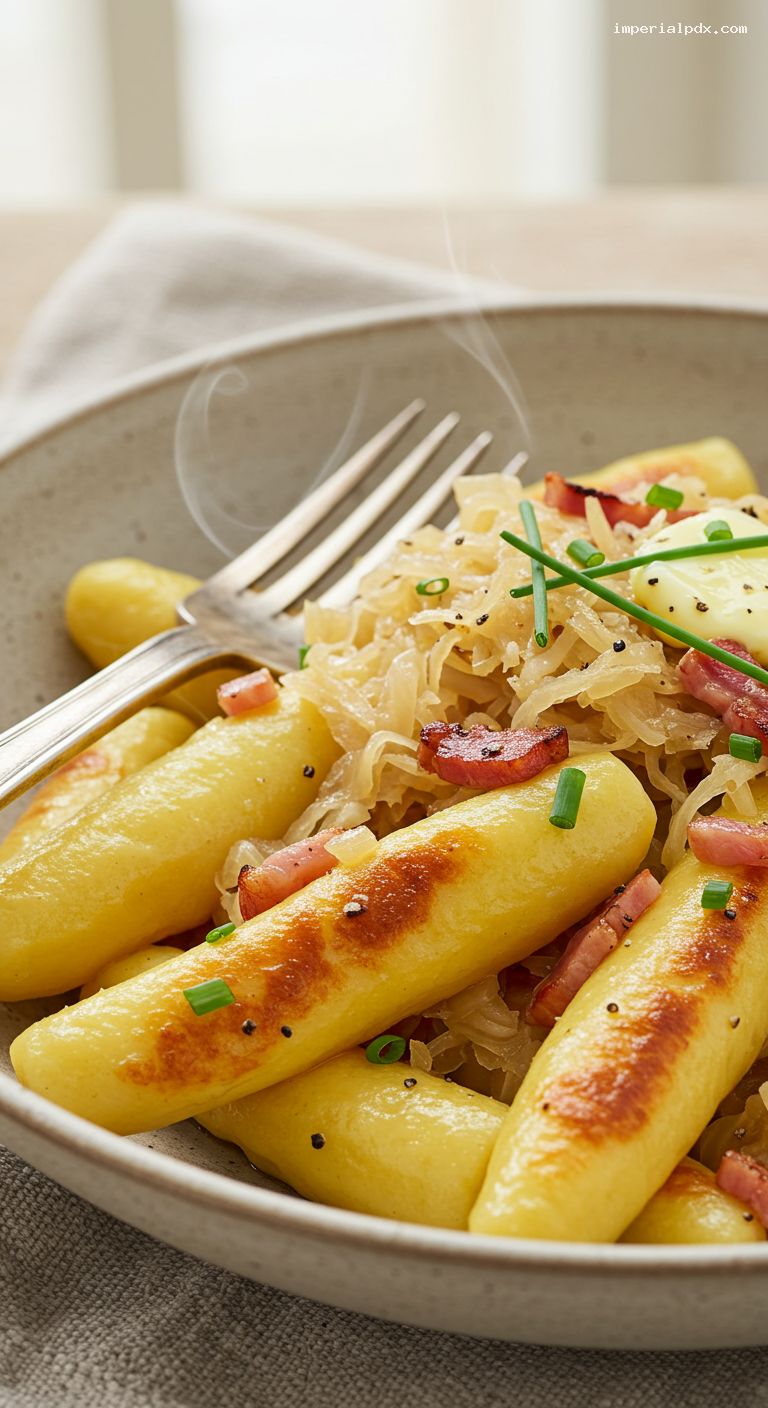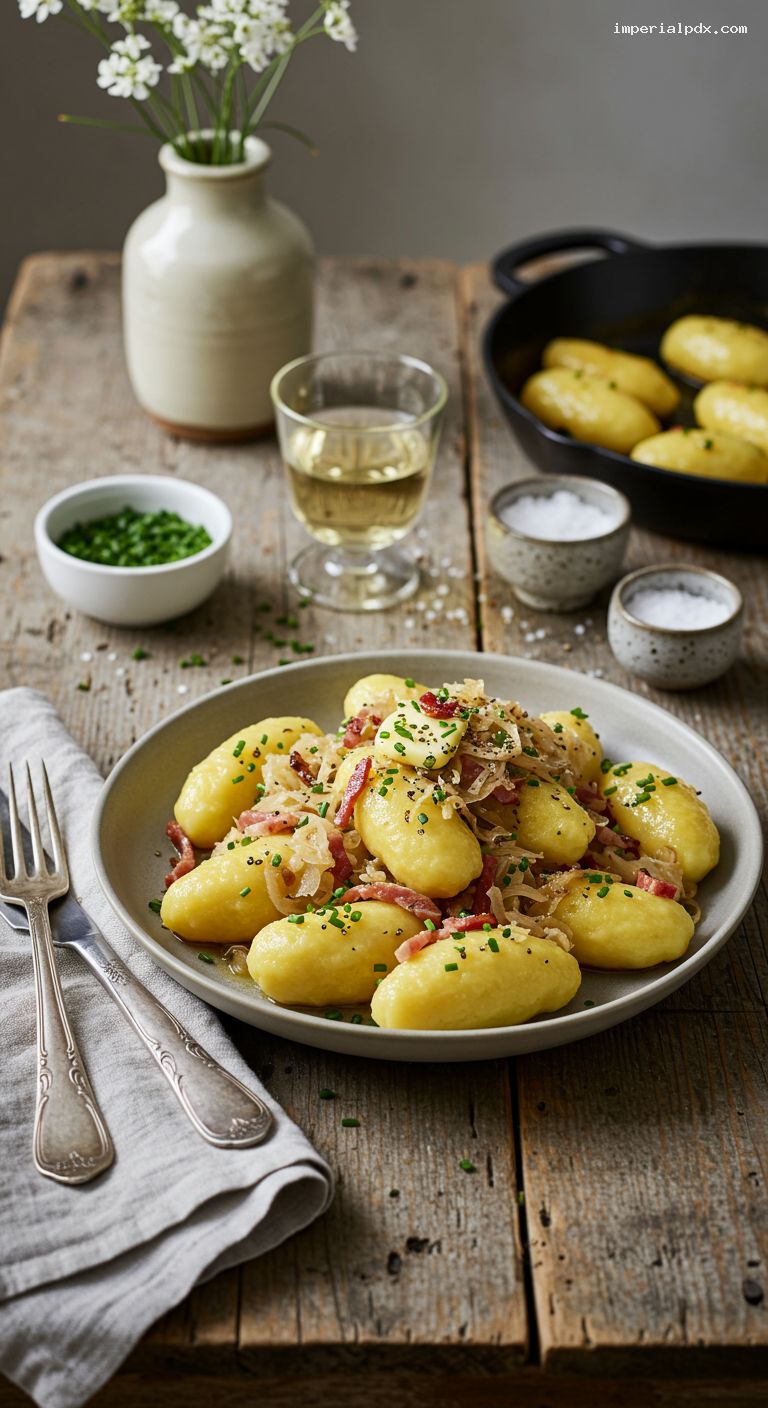Quick Recipe Version (TL;DR)
Quick Ingredients
- 900 g (2 lb) starchy potatoes (Russet or Yukon Gold)
- 150 g (1 1/4 cups) all-purpose flour, plus extra for dusting
- 2 large egg yolks
- 30 g (2 tbsp) unsalted butter, melted, plus 2 tbsp for cooking
- 1 tsp fine sea salt, 1 tbsp kosher salt for water
- 1/4 tsp ground nutmeg
- 150 g (5 oz) speck or thick-cut bacon, diced
- 1 medium yellow onion, thinly sliced
- 400 g (14 oz) sauerkraut, drained and lightly squeezed
- 1 tsp caraway seeds; 1/2 tsp sugar (optional)
- 60 ml (1/4 cup) dry white wine; 120 ml (1/2 cup) broth
- 1 tbsp neutral oil
- 2 tbsp finely snipped chives; coarse black pepper
Do This
- 1) Boil potatoes in salted water until tender, 20–25 minutes; drain and steam-dry 5 minutes.
- 2) Rice potatoes warm, mix with yolks, melted butter, salt, nutmeg, and flour to a soft dough.
- 3) Shape into tapered “noodles” (5–6 cm/2–2.5 in long). Poach in 190°F/88–90°C salted water until they float plus 2 minutes; drain.
- 4) Render speck in a large skillet over medium heat 6–8 minutes; add onion and butter, cook 4–5 minutes.
- 5) Stir in caraway and sugar; deglaze with wine, add sauerkraut and broth; simmer 5 minutes. Transfer kraut to a bowl.
- 6) In the same skillet, heat oil and butter over medium-high; pan-crisp schupfnudeln 3–4 minutes per side.
- 7) Toss noodles with kraut; finish with chives and plenty of coarse black pepper. Serve hot.
Why You’ll Love This Recipe
- Golden, pan-crisped potato noodles meet silky, buttery sauerkraut for the ultimate comfort food.
- Smoky speck, sweet onions, and caraway bring classic Alpine flavors to your kitchen.
- Clear, make-ahead friendly method with reliable timings for stress-free cooking.
- Flexible: go traditional, vegetarian, or shortcut with store-bought schupfnudeln.
Grocery List
- Produce: Starchy potatoes, yellow onion, fresh chives
- Dairy: Unsalted butter, eggs (for yolks)
- Pantry: Sauerkraut, speck or thick-cut bacon, all-purpose flour, fine sea salt, kosher salt, black pepper, caraway seeds, sugar, dry white wine, low-sodium broth, neutral oil, ground nutmeg
Full Ingredients
For the Schupfnudeln
- 900 g (2 lb) starchy potatoes (Russet or Yukon Gold), scrubbed
- 150 g (1 1/4 cups) all-purpose flour, plus 2–3 tbsp for dusting
- 2 large egg yolks
- 30 g (2 tbsp) unsalted butter, melted
- 1 tsp fine sea salt
- 1/4 tsp ground nutmeg
- 1 tbsp kosher salt (for the poaching water)
For the Kraut and Finish
- 150 g (5 oz) speck or thick-cut bacon, diced 6 mm (1/4 in)
- 1 medium yellow onion (about 150 g), thinly sliced
- 400 g (14 oz) sauerkraut, drained and lightly squeezed
- 1 tsp caraway seeds, lightly crushed
- 1/2 tsp granulated sugar (optional, to balance acidity)
- 60 ml (1/4 cup) dry white wine or apple cider
- 120 ml (1/2 cup) low-sodium chicken or vegetable broth
- 2 tbsp unsalted butter (for the pan), divided
- 1 tbsp neutral oil (canola or sunflower), plus more as needed
- 2 tbsp finely snipped fresh chives
- 1/2 tsp freshly ground coarse black pepper, plus more to taste
- Kosher salt, to taste

Step-by-Step Instructions
Step 1: Cook and dry the potatoes
Place the whole, unpeeled potatoes in a large pot and cover with cold water by 2.5 cm (1 inch). Add 1 tsp salt. Bring to a boil, then reduce to a lively simmer (200°F / 93°C). Cook until a knife slides in easily, 20–25 minutes for medium potatoes. Drain well, return potatoes to the hot pot, and let them steam-dry off the heat for 5 minutes. Peel while still warm.
Step 2: Rice the potatoes and make the dough
Rice the warm potatoes onto a clean work surface or into a large bowl. Spread to release steam and cool for 5 minutes until just warm. Sprinkle with fine sea salt and nutmeg, drizzle in the melted butter, and add egg yolks. Dust with about 120 g (1 cup) of the flour. Using a bench scraper or your hands, fold and press the mixture together. Add just enough of the remaining flour to form a soft, smooth dough that is barely tacky. Knead very gently for 30–60 seconds. Do not overwork.
Step 3: Shape the schupfnudeln
Lightly flour the work surface. Divide dough into 4 pieces. Roll each into a rope about 2 cm (3/4 in) thick. Cut into 5 cm (2 in) pieces. With lightly floured hands, roll each piece under your palms to form a slim, tapered “cigar” 5–6 cm (2–2.5 in) long with pointed ends. Arrange on a floured parchment-lined tray; do not stack.
Step 4: Poach the noodles gently
Bring a wide pot of water (about 3 liters) to a gentle simmer, 190°F / 88–90°C. Add 1 tbsp kosher salt. Poach the schupfnudeln in batches so they are not crowded. Stir once to prevent sticking. When they float, cook 2 minutes longer (about 4–5 minutes total). Lift out with a slotted spoon to a lightly oiled tray and let steam-dry. Repeat with remaining dough.
Step 5: Build the buttery sauerkraut base
Place the speck in a large 30 cm (12 in) skillet while it’s still cold. Set over medium heat and cook, stirring, until the fat renders and the speck edges crisp, 6–8 minutes. Spoon off excess fat, leaving about 1–2 tbsp in the pan. Add the sliced onion and 1 tbsp butter; cook until translucent and lightly golden at the edges, 4–5 minutes. Stir in the caraway and sugar; toast 30 seconds. Deglaze with white wine and simmer until nearly evaporated, 1–2 minutes. Add sauerkraut and broth; simmer gently 5 minutes. Transfer kraut mixture to a warm bowl and keep warm.
Step 6: Pan-crisp the schupfnudeln
Return the same skillet to medium-high heat (aim for a 375°F / 190°C pan surface if you have an infrared thermometer). Add 1 tbsp neutral oil and 1 tbsp butter. Add the schupfnudeln in a single layer; do not crowd. Cook undisturbed until the bottoms are deep golden and crisp, 3–4 minutes. Turn and brown the second side, 2–3 minutes. Work in 2 batches if needed, adding a little more oil/butter between batches.
Step 7: Toss, season, and serve
Return all schupfnudeln to the skillet. Add the warm kraut mixture and toss over medium heat for 1–2 minutes to coat. Season generously with coarse black pepper and taste for salt. Sprinkle with chives and serve immediately on warm plates.
Pro Tips
- Dry is key: let potatoes steam off moisture after draining and rice them warm for a fluffier, lighter dough.
- Use the minimum flour needed; too much flour makes dense noodles. The dough should feel soft and just barely tacky.
- Keep the poaching water at a gentle simmer (190°F / 88–90°C). A hard boil can break delicate noodles.
- For extra-crisp edges, chill poached schupfnudeln uncovered for 20–30 minutes before pan-frying.
- If your sauerkraut is very sharp, rinse briefly and squeeze, then add the optional sugar and wine to balance.
Variations
- Vegetarian: Skip the speck. Sauté 200 g (7 oz) sliced mushrooms in butter until browned, then proceed with onion, caraway, and kraut.
- Apple-onion kraut: Add 1 small tart apple, thinly sliced, with the onion for a gentle sweetness that loves caraway.
- Cheesy finish: Toss in 60 g (2 oz) grated Bergkäse or Emmental off heat and let it melt into the noodles.
Storage & Make-Ahead
Poach schupfnudeln up to 24 hours ahead: cool on a tray, then refrigerate covered. Crisp straight from the fridge. To freeze, arrange poached and cooled schupfnudeln on a lined tray until solid, then bag for up to 2 months. Reheat from frozen by simmering 3–4 minutes, then pan-crisp. Leftovers keep 3–4 days refrigerated; re-crisp in a skillet with a knob of butter over medium heat.
Nutrition (per serving)
Approximate: 690 calories; 28 g fat; 88 g carbohydrates; 18 g protein; 5 g fiber; 1450 mg sodium. Values will vary with speck/bacon and salt levels.

